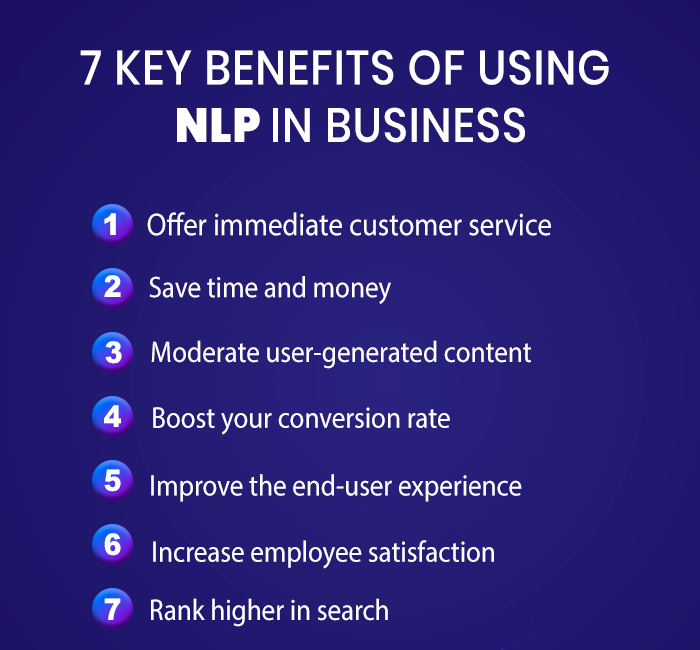Natural Language Processing (NLP) is one of the most important components of artificial intelligence. And companies across the world are investing more and more in NLP-based solutions. Why so? Because they can see the business potential. If you doubt the technology can benefit your organization, let’s see if we can change your mind.
Here’s a collection of seven reasons businesses invest in natural language processing: check them out and tell us if they alter your perspective.
1. Offer immediate customer service
Even if you’ve never heard of Natural Language Processing, we’ll guess you’ve likely heard of chatbots – AI-based software that can hold conversations with people on websites or in apps. Chatbots use NLP to help your customers get immediate answers to any question, no matter the time of day or day of the week.
If queries focus on the same themes, chatbots can use predefined answers to avoid customers ever waiting for a service desk response: because chatbots play the customer service executive role. What’s more, they can even provide specific support: like sharing a link to instructions, booking a service, or finding particular products. In truth, the possibilities are endless — it all depends on the business needs of the company in question.
And thanks to advances in machine learning techniques and analysis of specific words, chatbots can now detect a user’s intention.
In an era where immediacy is expected, chatbots are the perfect solution. They’ll even convert prospects into customers through ultra-attentive service — or where a visitor has a problem, avoid them switching to a competitor by quickly finding a solution.
As you can see, automated customer service brings many benefits. And according to research by Opus, companies will invest upwards of $4.5bn in chatbots by 2021.
2. Save time and money
Every business needs to make a profit. And if you can find a way to save, the money-making aspect becomes all the easier. NLP offers a proven way to save both time and money for businesses across industries.
Let’s use chatbots as a case study.
According to Chatbots Magazine, you can reduce customer service costs by upwards of 30% just by implementing automated help. NLP-based solutions free up employee time, allowing your people (and you) to focus on the creative tasks that engage your customers and boost your bottom line.
The solutions offer long-term benefits and what’s more, NLP-based software can be improved automatically all the time, often without additional investment. How’s that possible? When we provide our models with more data, they work better and more precisely. Let’s look at another example.
Suppose your database currently has no answers to questions about a product you’ve just released. In time, as customers ask questions, you’ll be able to use the same model to extend the number of answers provided by your chatbot.
A similar situation applies to other use cases of NLP-based solutions, such as a system for moderating comments on a website.
From time to time, people will introduce new words — usually, some form of internet slang — so it’s a good idea for a model to be able to analyze new sentences if it’s to stay as effective as possible.
3. Moderate user-generated content
Let’s leave chatbots to one side and look at another NLP-based solution. You can use the technology to enforce spam filters and block unwanted content; on websites and in email. Suppose you manage a news service, or a blog that attracts lots of comments.
NLP lets you moderate the user-generated content published by readers, enabling you to maintain your forum’s quality while avoiding controversy, unsolicited advertising, or backlinks to malicious sites — but the role of such solutions isn’t only to detect “forbidden” words or vulgarisms.
Even if the text contains no offensive words, a model could still classify it as hate speech. How’s that possible? Advanced NLP models, assuming they receive the appropriate amount of data, can learn to read the context of a sentence and classify it into the appropriate group.
Moreover, by using the appropriate tokens, the model can read a user’s emotions by analyzing the emoticons they use. You can even tailor the solution to an audience or place — because sometimes, the language of users is entirely different from website to website.
4. Boost your conversion rate
Converting site visitors to customers is the key focus of many marketing executives. And they use all manner of methods to optimize conversion because — the better the rate, the lower the customer acquisition cost.
NLP solutions are masters of conversion optimization. Offerings include our much-loved chatbots alongside simple-looking features like auto-complete text and more advanced search functionality.
The premise is simple: anything you do to make visitors dwell on your website is likely to make them more willing to buy — or use — your services.
5. Improve the end-user experience
Points one-through-four cover a common theme: they all improve the end-user experience. Meaning thanks to NLP, your website visitors can:
- Quickly find what they’re looking for — using semantic search engines
- Get help in an instant — using (you guessed it) chatbots
- See high-quality content only, avoiding spam or hate speech — using user-generated content (UGC) moderation tools.
The success of your business relies on your users having a positive experience. And the above factors each have a crucial impact on whether a user will tell their network about your products or services.
6. Increase employee satisfaction
AI-based solutions are built to handle the most time-consuming, mundane, or routine tasks — in the case of NLP-based software, these tasks include:
- Answering repetitive questions
- Moderating comments
- Acting as customer support
- Monitoring for references to a company or its services/products on social media
- Scanning documents for keywords and filtering them (for example, CVs)
- Classifying emails (for example, as spam)
- Spell checks
…. and many more.
If there are items your team would rather avoid, see if you can automate the tasks with AI or NLP. Not only will you make your employees happier. You’ll help them be more efficient — and you’ll give them time to focus on what they love.
In turn, you’ll see employee satisfaction shoot up, job engagement improve, and your employer brand will serve you well when it comes to retention and hiring.
7. Rank higher in search
Search engine optimization is a critical factor in business. Every company wants to rank as high as possible. And you guessed it: Natural Language Processing can help.
Solutions can analyze search queries, then detect and suggest related keywords, saving time spent on research while optimizing your content. As a result, your site’s SEO will improve, and your company will become more visible.






